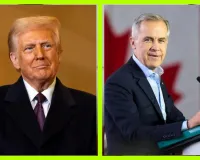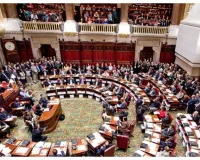Donald Trump Faces Another Setback as US Court Blocks Key Decision

In a major blow to Donald Trump following Elon Musk's separation, a US court has put a stay on a crucial decision, citing it as unconstitutional. This development adds another layer of complexity to Trump's legal and political challenges. Stay tuned for further updates on this unfolding story.
Donald Trump News: After Tesla CEO Elon Musk's announcement of separation from Donald Trump, the US President has got another big blow. The US court has given a big blow to Trump and put a stay on his 'Liberation Day' tariff. While giving the verdict, the US court said that this is against the Constitution.
In fact, Trump had ordered to impose equal tax on goods coming from those countries, which buy less goods from America and sell more goods to it. This move was called 'Liberation Day' tariff. The Trump administration had announced to impose heavy tariffs on all countries in April itself. However, this decision was challenged in the court by the traders of America.
While hearing the petition, a three-judge bench of a Manhattan-based federal court said that according to the US Constitution, only the US Congress, not the President, has the right to control trade with foreign countries. The court also clarified that this matter does not fall under the emergency powers of the President.
The court said that the law under which Trump imposed these tariffs does not give him such unlimited power. The judges wrote in their order, “This claim by the President to impose tariffs, which have no time or scope limit, goes far beyond the authority given under the law. These tariffs are illegal. According to the US Constitution, the right to impose tariffs lies with the Parliament i.e. Congress, not the President. Only in extraordinary emergencies does the President get limited powers, but in Trump's case there was no such valid emergency.
Actually the Trump administration had argued that in 1971, the then President Richard Nixon had also imposed tariffs under emergency and the court had approved it then. He also said that it is the right of Congress, not the court, to decide the validity of the President declaring an emergency. But the court rejected this argument.





.png)
.png)
.png)
.png)
.png)
.png)

